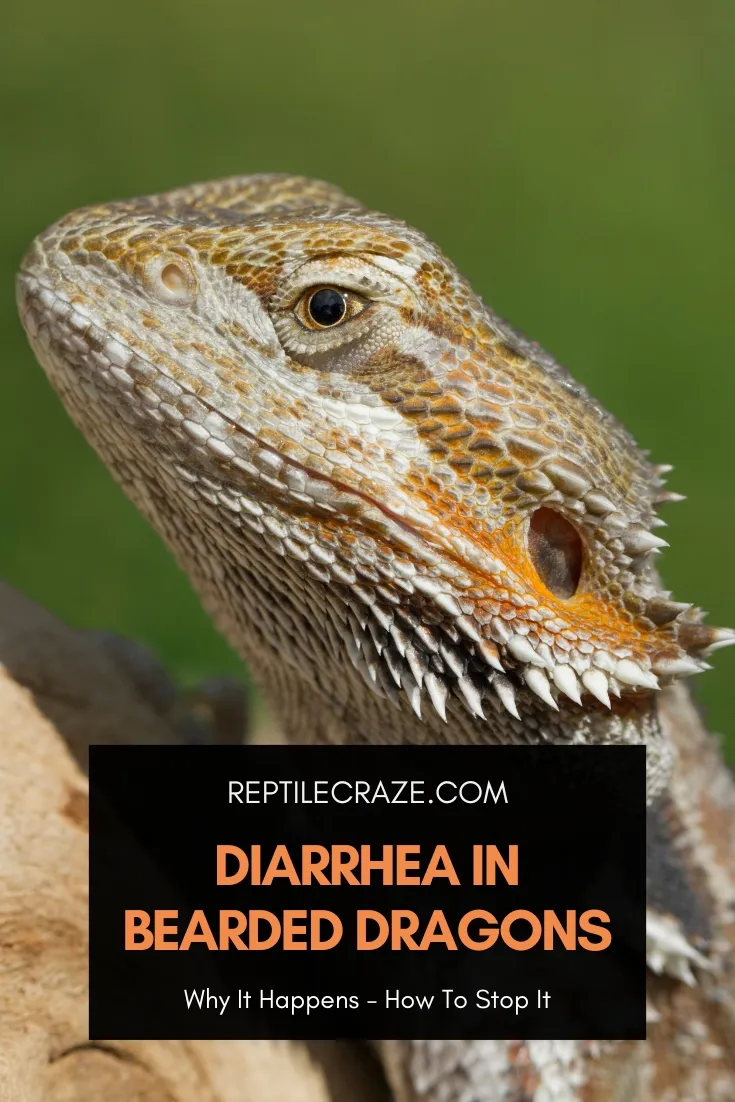
Did your bearded dragon pass a runny stool? Does the poop look abnormal? Your bearded dragon may be suffering from diarrhea. Why does your bearded dragon have diarrhea and what can you do to relieve its symptoms?
The symptoms of diarrhea in bearded dragons are abnormal poop, lethargy, loss of appetite, weight loss, and sudden defensiveness due to irritability. Stress, parasites, wrong diet, and poor enclosure conditions can cause diarrhea. Severe cases require medical intervention.
If you think your bearded dragon is suffering from diarrhea, you should pay close attention to it as if it progresses, it may lead to death. We interviewed Dr. Erwin Filomena to find out why beardies get diarrhea, what you can do to help and prevent this, and when it is time to visit a vet.
Let’s get started!
Table of Contents
How To Determine If Your Bearded Dragon Is Suffering From Diarrhea
Before you lose your cool when you see the first sign of possible diarrhea, you should first determine if your bearded dragon is actually suffering from it. It will cause unnecessary stress on your bearded dragon if you prematurely treat it for diarrhea.
Here are the things to be on the lookout for to be absolutely sure that your bearded dragon has diarrhea.
Bearded Dragon Has Abnormal Poop
A normal bearded dragon poop is composed of two parts. It has a brown part which is the excrement of the bearded dragon.
The poop also has a slightly yellow or white tip which is called a urate, this is the urine of bearded dragons.
According to Dr. Erwin Filomena, a herp veterinarian, the brown part of the poop should hold its shape and does not need to be very firm.
As for the urate, it is soft, almost squishy. He said that it is also normal for the poop to sometimes come with a bit of transparent liquid.
Based on our interview with Dr. Filomena, these are considered abnormal poop:
- The brown part of the poop is too hard (makes a “thud” sound when dropped on a surface)
- Runny poop (poop cannot hold its shape)
- Liquid poop
- Poop has mucus
- White poop (a sign of dehydration)
- Yellow poop (a symptom of issues with the liver)
- Bloody poop
- Poop that has an extremely foul smell
Dr. Filomena noted that out of all the types of abnormal poop, having runny poop and poop that has mucus are the biggest signs that your bearded dragon has diarrhea.
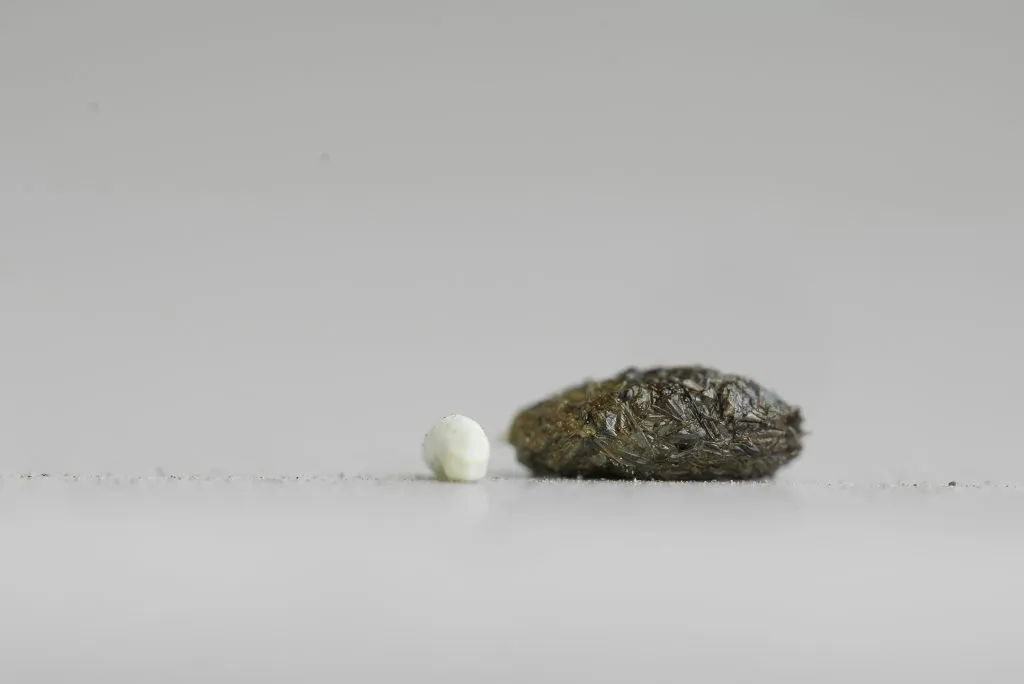
He added that usually, once these types of poop emerge, the next set of poops will just be liquid poop and sometimes bloody poop.
Frequency Of Pooping In Bearded Dragons
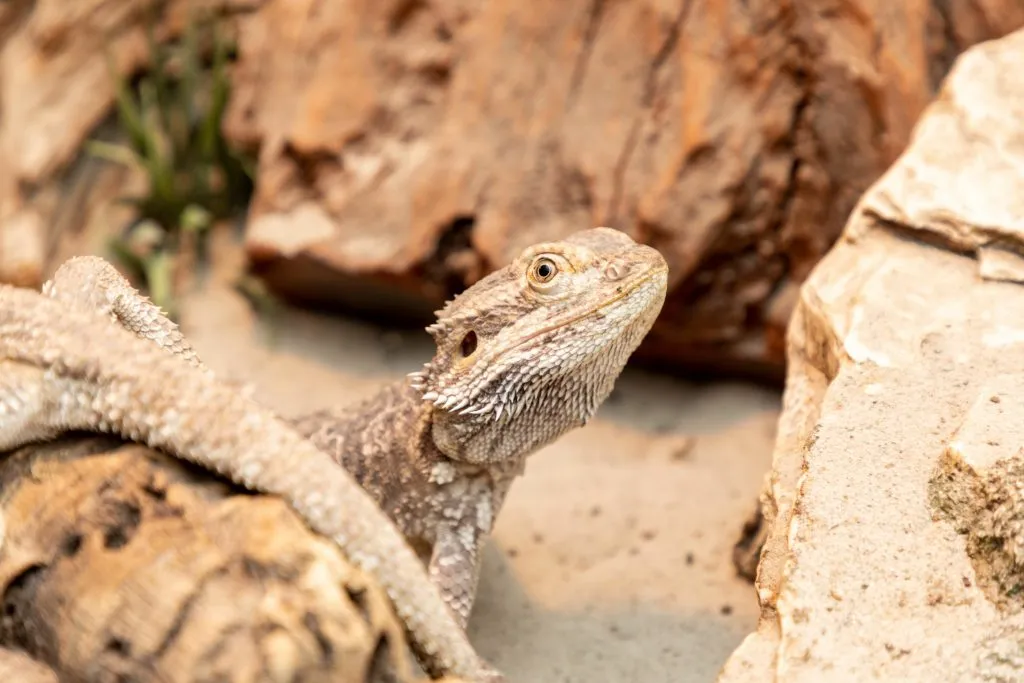
Dr. Filomena advised that even before you conclude that your bearded dragon has diarrhea after it excreted abnormal-looking poop, you should first monitor the frequency of its poop.
He added that there are many cases where owners immediately bring their beardies to the vet upon seeing abnormal poop when in fact, the cause was just stress or a change in diet.
What ends up happening is the beardie gets severely stressed and ends up getting diarrhea as a consequence.
An adult bearded dragon usually poops twice to four times a week. While a baby bearded dragon can poop multiple times a day. As the owner of your beardie, you will know the normal pooping frequency of your beardie.
If it continues to excrete abnormal poop on a given day or if it excretes abnormal poop shortly after eating, then definitely, your bearded dragon has diarrhea.
Causes Of Diarrhea In Bearded Dragons
Once you determine that your bearded dragon is suffering from diarrhea, you should also know the possible cause behind it. It is important to do this for you to know if you need to immediately go to the vet.
Dr. Filomena stated that it is always a good idea to consult the vet.
However, there are times when diarrhea can pass on its own and can be remedied by proper diet and adjustments to the setup of the enclosure. The unnecessary travel to the vet may only increase the symptoms of diarrhea.
On the other hand, if the abnormal poop is bloody or liquidy, and it has been too frequent, then no matter the cause, you should definitely go to the vet.
Tip: If you need help with caring for your bearded dragon, read our bearded dragon care guide here!
Bearded Dragon Has Parasites
When your bearded dragon is suffering from diarrhea due to parasites, their poop will be runny, liquid, bloody, and has mucus.
The course of action when you suspect that your beardie is having diarrhea due to parasites is to immediately go to the vet.
Here are the most common parasitic infections in bearded dragons.
Cryptosporidiosis
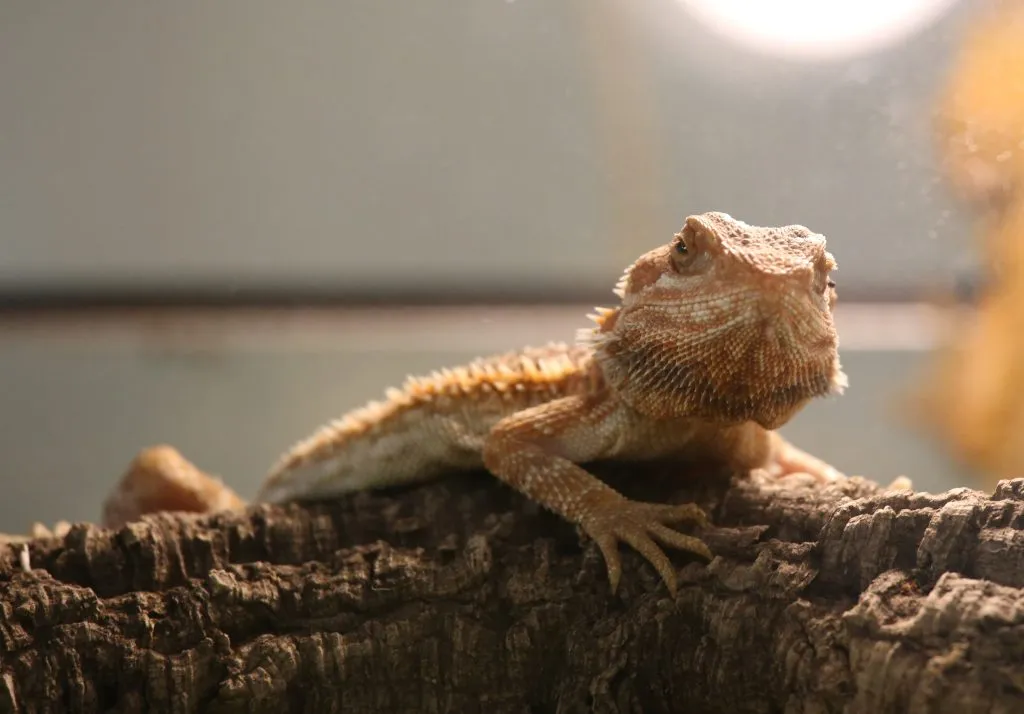
According to Dr. Filomena, this is a parasite that develops in
If you leave a
The same goes for the water bowl that you were not able to clean daily. Poop particles may have found their way to the water and the parasites are just waiting for your beardie to have a drink.
Bearded dragons that have this may have runny and bloody poop. You will also notice that their bellies will start to swell even if they are refusing to eat and drink.
Isospora Amphiboluri (Coccidia)
This is a parasite that has been widespread in bearded dragons even the ones that are bred in captivity.
Dr. Filomena stated that your bearded dragon may already have this parasite but your beardie’s body is able to manage it as it is in a healthy condition.
This parasite only acts up when the immune system of your bearded dragon is compromised. This can be due to stress, change in diet, undergoing a shed, and other factors.
In Dr. Filomena’s experience, adult bearded dragons that get diarrhea due to this parasite usually need to get the parasite out of their system.
Sometimes, they do not need to treat the adult bearded dragons with antibiotics, rather they monitor them to prevent dehydration.
In some cases, where the fecal floatation test shows that the parasites are multiplying, they will administer Sulfamethoxydiazine to prevent the reproduction of the parasite.
On the other hand, this parasite proves to be deadly to baby bearded dragons. Besides diarrhea, baby bearded dragons with this parasite may suffer rapid weight loss, anorexia, and severe dehydration.
In severe cases, Paromomycin is administered to prevent complications in the liver.
Pinworms
This can be diagnosed via fecal floatation or direct fecal smear.
According to Dr. Filomena, a common indication of the presence of pinworms in your bearded dragon is for it to have a fully formed poop that is greener than it is brown. It can also be runny brown and greenish poop.
In general, green poop is not that abnormal as it just means that your beardie’s poop was tinged with its green leafy vegetable diet.
However, if the diet is offset by too many green vegetables, pinworms will thrive as they reside in the colon and lower intestine, in which they play a role in the digestion of an herbivore diet.
This is also why it is important to balance the diet of your beardies and keep them omnivores.
Bearded Dragon Is Under Immense Stress
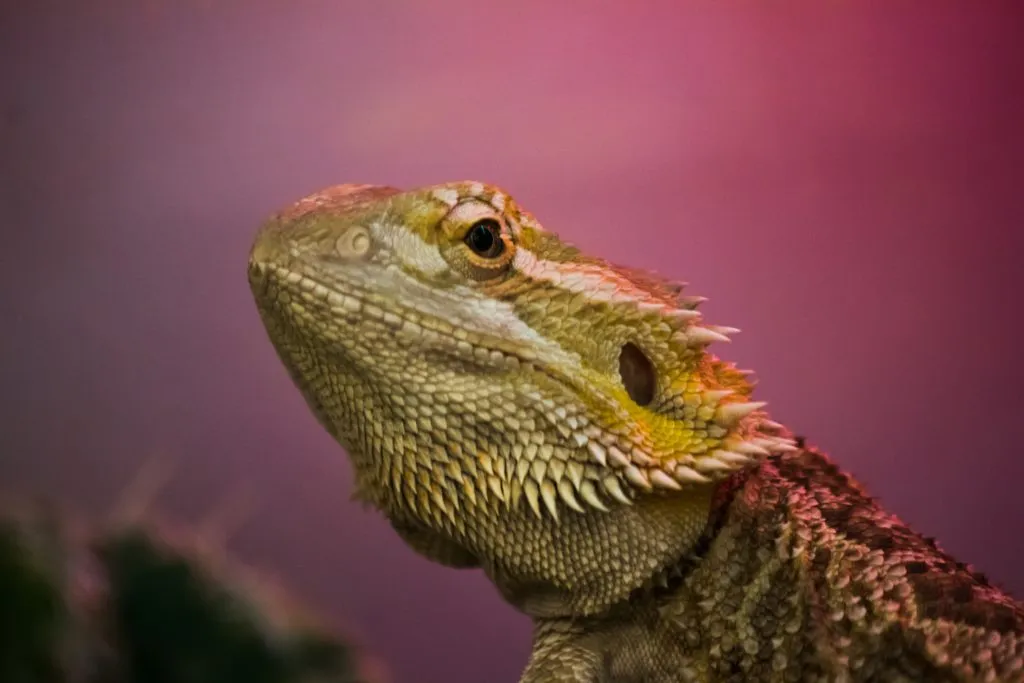
Stress leads to a compromised immune system that can affect the respiratory and digestive systems of your bearded dragon.
Your bearded dragon may be stressed if you just got it recently and it is still unfamiliar with the enclosure.
This is why it is important not to feed them instantly, as they may become constipated due to stress.
They can also be stressed when they are about to shed. Too much handling can also stress them when they are still not used to handling.
Tip: You can check this article to see how often you can handle your bearded dragon so as not to stress it too much.
If the area where their enclosure is located is chaotic, they may not be getting enough rest which also leads to stress.
Incorrect Diet
Bearded dragons are omnivores so they eat both insects and plants. However, owners tend to go heavy on feeding them fruits and vegetables when in fact insects should comprise 75% of their diet.
At the same time, feeder insects should also have a balance of fat and protein so that your bearded dragon will not become obese.
It is best to ask the breeder about the feeding schedule and feeder rotation that your beardie is used to.
If you want to make adjustments, you should do so gradually. Abruptly changing the
Further, make sure that the insects are gut loaded and that the fruits and vegetables are not spoiled.
Poor Enclosure Conditions
It is possible that a bearded dragon has diarrhea when the lighting and heating in the enclosure are incorrect. If the
If the
Additionally, if the enclosure is dirty, it will be a haven for mold and bacteria. If your bearded dragon is living in filth, it will be stressed and end up having diarrhea.
Realistically speaking, it is difficult to deep clean the
How Diarrhea Affects Bearded Dragons
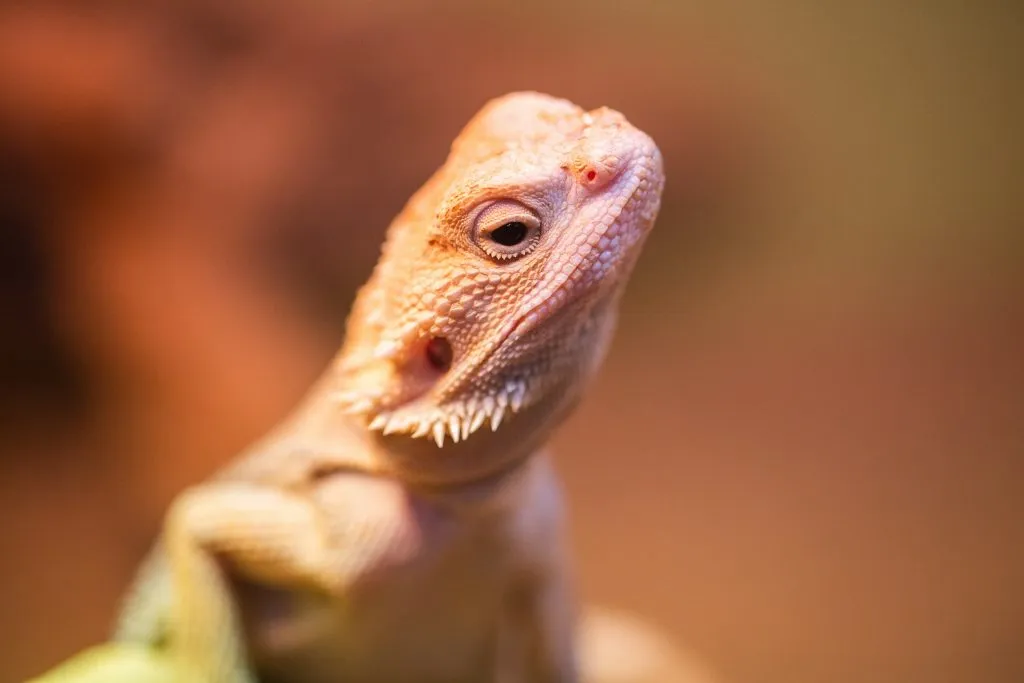
According to Dr. Filomena, diarrhea in itself does not weaken or compromise the health of your bearded dragon. It is actually the other symptoms brought about by diarrhea that put the life of your bearded dragon in danger.
If the diarrhea is caused by parasites, the treatment is straightforward in killing and preventing the reproduction of the parasites but managing the other symptoms is equally important for the full recovery of your beardie.
Dehydration
Just like humans, bearded dragons become dehydrated due to constant pooping. Water is no longer retained in the system due to the continuous pressure in the intestines to flush out toxins.
Dehydration is the number one killer of beardies that are suffering from diarrhea, especially when it is caught late. This is why Dr. Filomena deals with dehydration first before proceeding to diagnose the cause of diarrhea.
Depending on the state of the beardie, he will administer subcutaneous liquid to the bearded dragon to prevent further dehydration.
In serious cases, they will also attach wet cloths to the eyes of the beardie and continuously pat the body with a damp cloth.
Anemia
Anemia usually happens when diarrhea is caused by parasites.
The system of bearded dragons constantly produces white blood cells to deal with the parasites and other symptoms of diarrhea and there is a decrease in the production of red blood cells, leading to anemia.
Dr. Filomena stated a case where a bearded dragon was brought to the clinic for diarrhea and later on died from anemia.
The problem with this is that treating diarrhea may not help with anemia as their system will keep producing white blood cells. Anemia can only be addressed in the recovery period.
If there are any blood transfusions ready, then there is a chance for rapid recovery from anemia, but other than that, it is through diet, vitamins, and maintenance of the enclosure during the recovery period that anemia can be beaten.
Lethargy
Your bearded dragon will start to become lethargic in the first two days that it is frequently relieving itself. This is due to dehydration as well as the beardie’s reluctance to eat.
Further, your beardie’s body is working overtime to deal with the symptoms of diarrhea and it is constantly burning energy without the aid of
During this time you will see that your beardie will not even move away from the basking spot or will just stay in the hide.
In severe cases, your beardie cannot even open its eyes or lift its head. This is dangerous as some beardies drown in their water bowls when they let their heads fall in the water bowl sideways.
Behavioral Changes
In the days leading to the onset of diarrhea, your bearded dragon will be more defensive than usual. This also includes beardies that are tamed and used to handling.
You may notice that when you approach the enclosure, they will hide from you or they will try to bite or claw at you.
You may also see them pacing the enclosure as they are forced to relieve themselves. They will also nap more often and may even refuse to bask.
Compromised Immune System
Even if diarrhea is resolved, your beardie has a long way to go for a full recovery. It is in the recovery period that they are susceptible to other diseases.
Therefore, you have to be sure that the condition of the enclosure is at its best. Their diet should be balanced and the enclosure is kept clean.
According to Dr. Filomena, respiratory disease is usually the culprit in the deaths of bearded dragons following a bout of diarrhea.
Proper thermoregulation is key to building up their immune systems again.
Trauma
A lot of owners get frustrated when they take their beardies home after an extended stay at the vet. Even if diarrhea has passed, bearded dragons still refuse to drink, eat, and bask.
Dr. Filomena stated that recovering fully from severe diarrhea due to parasites takes a long time as the bearded dragon has experienced trauma.
It is afraid to eat and wander the enclosure freely due to the stress and pain that it experienced.
This is also the reason why they usually extend the stay of bearded dragons even if the diarrhea is resolved. The vets want to be sure that by the time the beardies go home, they can already eat and drink.
Treatment Of Diarrhea In Bearded Dragons
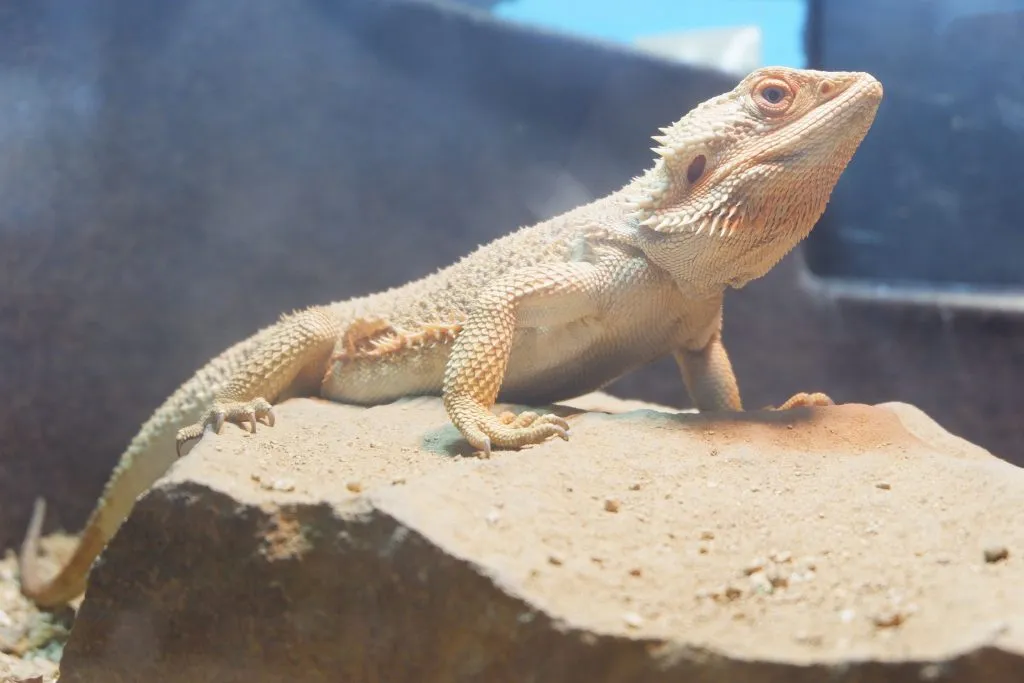
Here is what you can do when your bearded dragon has diarrhea based on what caused it.
Diarrhea Due To Parasites
Immediately go to the vet. If you think that your bearded dragon is dehydrated, you should not attempt to give it a soak as it may stress it more.
Wrap your bearded dragon in a towel that is soaked with water and travel with the towel wrapped around it. If it is possible, collect the poop of your beardie so you can show it to the vet.
You can also take a close-up video of it just so the vet can have an initial idea for diagnosis.
Dr. Filomena added that after the diarrhea is resolved, based on how severe the diagnosis is, it can take up to 21 days to finish the medication. Usually, beardies are released on the 9th or 10th day and it is up to the owner to administer the medicine.
Diarrhea Due To Stress
If you think that your bearded dragon is having diarrhea due to stress, you just have to leave it alone. Before doing so, make sure that the lighting and heating of the enclosure are under the needed parameters.
Spot-clean the enclosure and remove any poop particles found inside. Thoroughly wash the water bowl and replenish it with water mixed with sugar. The ratio is 1 tsp. of sugar for half a cup of water.
Skip the next feeding schedule and observe if your bearded dragon still has runny poop. If it does, repeat the process and check the poop again.
If it is still soft but has a shape, you can feed it a fiber-dense diet that is rich in vitamins and minerals, such as bok choy, sweet potato yams, endive, or dandelion greens.
On the other hand, if your bearded dragon is still pooping frequently, even without feeding, you have to go to the vet.
Diarrhea Due To Diet And Enclosure Conditions
If your bearded dragon is having diarrhea due to a wrong diet. You have to halt the feeding schedule and start from scratch. Do not feed your beardie for two to three days, but provide it with sugar water.
On the 4th day, feed it with fiber-dense
On the next feeding schedule, add a feeder insect, preferably a dubia roach with vegetables.
The poop and appetite of your bearded dragon should get better with each feeding schedule until the poop looks normal.
On the other hand, if your bearded dragon got diarrhea due to underheating or overheating, immediately check your heat and UVB lamps.
Tip: If you want to know what the best UVB lights for bearded dragons are, read our article here. If you would like to know what the best heat lamps for beardies are, read this article.
You can use an infrared thermometer like this to know the ambient temperature and the basking temperature.
Replace the heat and UVB bulbs just to make sure that there will be no temperature fluctuation. Observe your beardie for a complete day and night cycle (24 hours) after one cycle, if it is still having diarrhea, you need to go to the vet.
How To Prevent Your Bearded Dragon From Having Diarrhea
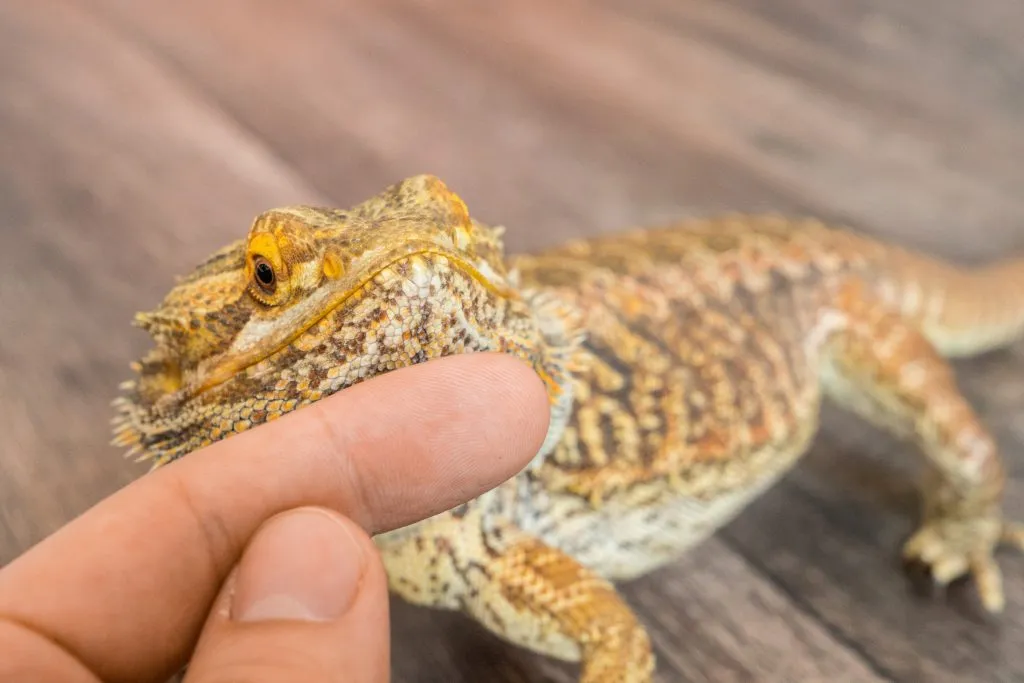
Here are some tips from Dr. Filomena to prevent your bearded dragon from having diarrhea.
Disinfection Of The Enclosure
Hygiene is important to prevent the cross-contamination of bacteria and parasites in the enclosure. You have to keep up with a cleaning schedule that involves spot cleaning and deep cleaning.
Never leave
Immediately remove any poop from the enclosure and wipe the extremities of your bearded dragon if it happened to step or drag the poop. Regularly clean and disinfect the water bowl.
For spot-cleaning the glass of the enclosure and the
It can kill bacteria without compromising the health of your beardie. Make sure that it is completely dry before putting your beardie back in the enclosure.
Boost The Immunity Of Your Bearded Dragon
Besides giving your bearded dragon a balanced diet, you can also boost its immunity by giving them probiotics and vitamins.
You can add this probiotic powder to the
If you think that the water that you provide to your beardie contains too many chemicals, you can also use a reptile-safe water conditioner like this one.
Soak Your Bearded Dragon
A good soaking of your bearded dragon can help prevent diarrhea in such a way that you lessen the chances of impaction (which could lead to an irritation of the bowel).
You can take it up a notch by using a reptile soak (like this one) that also has vitamins, minerals, probiotics, and prebiotics that help enhance the digestive system.
The soak can also get rid of poop and
Stress Prevention

Do not force your bearded dragon into handling training when it is not ready. Make sure that there are enough hiding spaces in the enclosure and that the lighting and heating are maintained.
If you have other pets in the house, do not let them near your beardie’s enclosure. You can use a cloth to cover part of the enclosure to make your beardie feel secure.
Turn off the lights at night so your beardie can have a good night’s sleep.
If your beardie is about to shed, provide it with rough surfaces in the enclosure to help remove the shed. If it is having a hard time, check the humidity first by using a hygrometer (30-40%) before you mist or give your beardie a bath.
Conclusion
Before you panic when you see your bearded dragon expelling abnormal poop, you should first determine the cause of a probable case of diarrhea.
Close observation of your beardie and its enclosure will show clues on whether you can deal with the problem at home or if you need to go to the vet.
Keep calm and make the necessary adjustments that we mentioned to help your bearded dragon overcome diarrhea.
- Enchi Ball Python: A Unique and Stunning Morph of Python regius - March 27, 2025
- Emerald Tree Monitor: The Enigmatic Green Guardian of the Rainforest - March 26, 2025
- The Egyptian Cobra (Naja haje): A Fascinating Serpent - March 25, 2025
